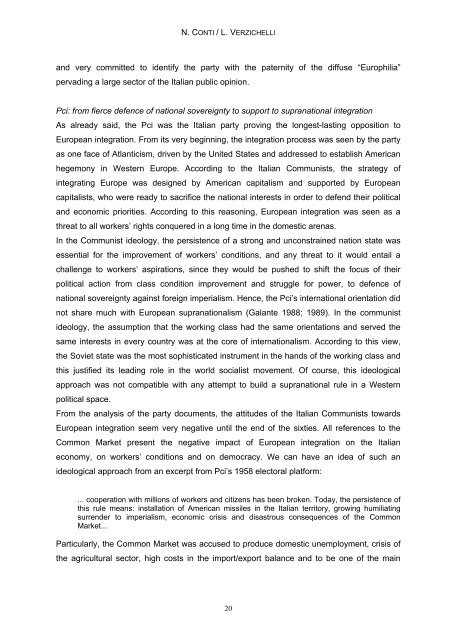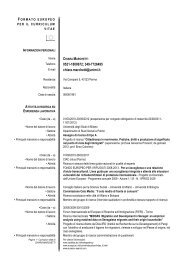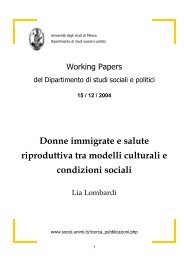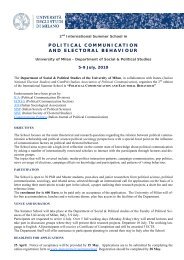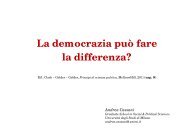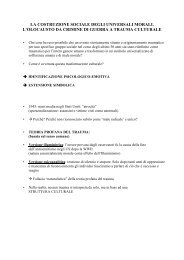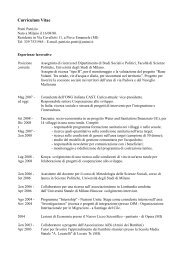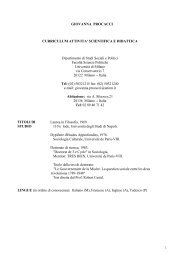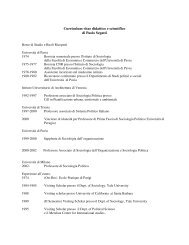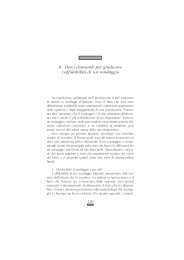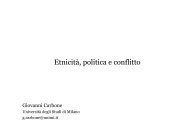The european dimension of political discourse in Italy. A ... - CIRCaP
The european dimension of political discourse in Italy. A ... - CIRCaP
The european dimension of political discourse in Italy. A ... - CIRCaP
You also want an ePaper? Increase the reach of your titles
YUMPU automatically turns print PDFs into web optimized ePapers that Google loves.
N. CONTI / L. VERZICHELLI<br />
and very committed to identify the party with the paternity <strong>of</strong> the diffuse “Europhilia”<br />
pervad<strong>in</strong>g a large sector <strong>of</strong> the Italian public op<strong>in</strong>ion.<br />
Pci: from fierce defence <strong>of</strong> national sovereignty to support to supranational <strong>in</strong>tegration<br />
As already said, the Pci was the Italian party prov<strong>in</strong>g the longest-last<strong>in</strong>g opposition to<br />
European <strong>in</strong>tegration. From its very beg<strong>in</strong>n<strong>in</strong>g, the <strong>in</strong>tegration process was seen by the party<br />
as one face <strong>of</strong> Atlanticism, driven by the United States and addressed to establish American<br />
hegemony <strong>in</strong> Western Europe. Accord<strong>in</strong>g to the Italian Communists, the strategy <strong>of</strong><br />
<strong>in</strong>tegrat<strong>in</strong>g Europe was designed by American capitalism and supported by European<br />
capitalists, who were ready to sacrifice the national <strong>in</strong>terests <strong>in</strong> order to defend their <strong>political</strong><br />
and economic priorities. Accord<strong>in</strong>g to this reason<strong>in</strong>g, European <strong>in</strong>tegration was seen as a<br />
threat to all workers’ rights conquered <strong>in</strong> a long time <strong>in</strong> the domestic arenas.<br />
In the Communist ideology, the persistence <strong>of</strong> a strong and unconstra<strong>in</strong>ed nation state was<br />
essential for the improvement <strong>of</strong> workers’ conditions, and any threat to it would entail a<br />
challenge to workers’ aspirations, s<strong>in</strong>ce they would be pushed to shift the focus <strong>of</strong> their<br />
<strong>political</strong> action from class condition improvement and struggle for power, to defence <strong>of</strong><br />
national sovereignty aga<strong>in</strong>st foreign imperialism. Hence, the Pci’s <strong>in</strong>ternational orientation did<br />
not share much with European supranationalism (Galante 1988; 1989). In the communist<br />
ideology, the assumption that the work<strong>in</strong>g class had the same orientations and served the<br />
same <strong>in</strong>terests <strong>in</strong> every country was at the core <strong>of</strong> <strong>in</strong>ternationalism. Accord<strong>in</strong>g to this view,<br />
the Soviet state was the most sophisticated <strong>in</strong>strument <strong>in</strong> the hands <strong>of</strong> the work<strong>in</strong>g class and<br />
this justified its lead<strong>in</strong>g role <strong>in</strong> the world socialist movement. Of course, this ideological<br />
approach was not compatible with any attempt to build a supranational rule <strong>in</strong> a Western<br />
<strong>political</strong> space.<br />
From the analysis <strong>of</strong> the party documents, the attitudes <strong>of</strong> the Italian Communists towards<br />
European <strong>in</strong>tegration seem very negative until the end <strong>of</strong> the sixties. All references to the<br />
Common Market present the negative impact <strong>of</strong> European <strong>in</strong>tegration on the Italian<br />
economy, on workers’ conditions and on democracy. We can have an idea <strong>of</strong> such an<br />
ideological approach from an excerpt from Pci’s 1958 electoral platform:<br />
... cooperation with millions <strong>of</strong> workers and citizens has been broken. Today, the persistence <strong>of</strong><br />
this rule means: <strong>in</strong>stallation <strong>of</strong> American missiles <strong>in</strong> the Italian territory, grow<strong>in</strong>g humiliat<strong>in</strong>g<br />
surrender to imperialism, economic crisis and disastrous consequences <strong>of</strong> the Common<br />
Market...<br />
Particularly, the Common Market was accused to produce domestic unemployment, crisis <strong>of</strong><br />
the agricultural sector, high costs <strong>in</strong> the import/export balance and to be one <strong>of</strong> the ma<strong>in</strong><br />
20


